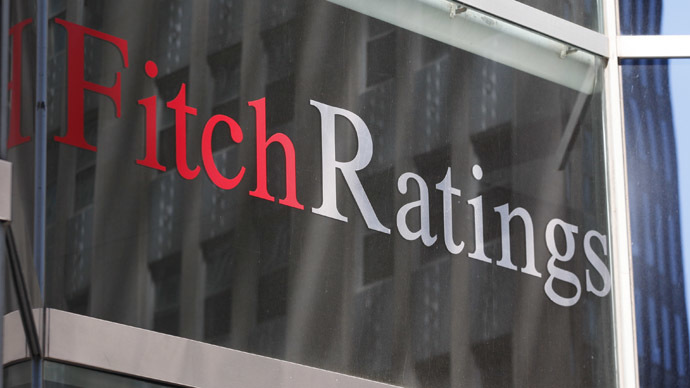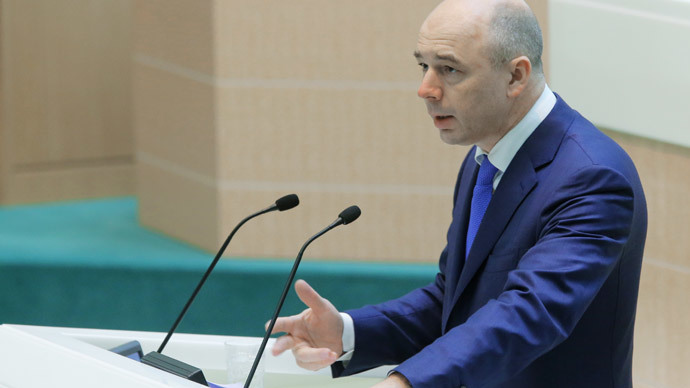‘Negative press about Russia affects Fitch ratings’

Excessive negative press can indirectly affect ratings, Ben Aris, Editor in Chief of Business New Europe told RT. Russia’s downgrade doesn’t reflect instability, just as 2008 proved a triple A Fitch rating doesn’t necessarily guarantee economic stability.
RT:How reliable are they? They couldn’t detect the credit crunch back in 2008, for instance…
Ben Aris: Indeed, I mean the credit agencies have come in for a lot of criticism in the past for basically getting it wrong. I mean, they were handing out investment triple A ratings to some of the assets that then collapsed in spectacular fashion in 2008. So they haven’t made themselves particularly reliable. Moreover, independent studies have compared some of the western credit agencies ratings of countries like Russia – compared to those coming out of the newer agencies like those in China and Russia – have found significant differences. The macroeconomic look of Russia – the fundamentals are actually pretty strong, and could argue for a higher rating than it gets.
It makes a significant difference. The economics minister said that a downgrade of one notch like this is going to cost Russia an extra $20 or $30 billion because there’s a metric which is used to price the cost of risk, so each notch you downgrade, you add a certain cost to cover the extra risk – and that’s mechanical, when people are pricing bonds. So in the short term this is going to cost Russia a couple of tens of billions of dollars, at a time when it’s still scrabbling around for money, so it’s going to make life more difficult.
RT:Not that long ago it was just primarily two ratings agencies – now there are a lot more. Why?
BA: Again, it’s this problem of credibility. In 2008, people were buying triple A rated assets which is supposed to be a 100 percent guarantee –solid– that they won’t go bust. And these assets turned out to be worthless. And the people looking at the credit rating agencies and saying you know, well you were giving us guarantees that these things weren’t going to go bust, and we’ve just lost all our money. And that’s led to the opportunity where other agencies say we do a better job, our estimates of risk are more accurate, and so people are looking at these other agencies to get a better idea of what’s going on.
At the same time the two leading agencies are both American and so there’s a political dynamic here as well where countries like China and Russia…

RT:Well I was going to ask you about that – that’s the accusation, is that really true?
BA: Well, like I said earlier, if you look at things like debt – Russia has sovereign debt on the order of a few teens – around 13 or 14 percent. At the same time it has this massive reserve of hard currency. Around $400 billion – which is enough to cover nearly two years’ worth of imports. So that’s an enormous cushion, and therefore, you would have thought that the state’s debt– its sovereign bonds – are about as solid as they could get. And yet it has this triple B- rating, whereas you look at some of the western European countries, where they have tiny reserves (one or two months / two or three months) of hard currency – and they have debts running to over 100 percent of GDP, and you have to ask whether their sovereign debt is as credit worthy. And the Russians have been saying, actually our debt is rock solid, so why do we have this rubbish rating, this doesn’t reflect the reality. And so they’ve been encouraging their own debt agencies to set up and to give what they think is a fairer perspective.
And this has been backed up by research. I mean Raiffeisenbank in Austria did research looking at the macro – just purely macro numbers and making the comparison, and found that Russia should actually be a double A or a single A rated country if you took it purely on the macroeconomics. And this has raised the debate that there is some politics behind this, or mood, or just a general bad light that Russia’s seen in that has unfairly and subjectively affecting its rating.
Video: /files/opinionpost/36/12/b0/00/fitchdowngrade.mp4
RT:How independent are the major credit-ratings agencies?
BA: They’re private companies, so we assume that
they’re completely independent and not subject to political
pressure. However, they do exist in an American context and are
subject there to the international media’s reporting which tends
to give a single narrative – a very negative narrative when it
comes to reporting – particularly the Russia story.
And that has to weigh on their assessments – they are trying to
base their ratings on mathematics and the macroeconomic numbers.
But nonetheless, into any risk assessment scenario is subjective
element from the analyst. And this negative torrent of reporting
is going to push the ratings down. So having purely American
rating agencies is probably a bad idea – you need to have some
sort of geographic distribution so that you get other analysts
from different locales who have a different perspective on the
Russia story in particular.
I think it’s just that the context they exist in. Reporting on Russia is very one-sided; all the negative stories are reported in detail and the more positive stories such as the success the Kremlin has had with turning around the demographic decline, for example, where that’s actually growing. And that weighs heavily on economics, looking forward to your future forecasts. And that story is not getting reported at all. So if you only have the bad stuff – your risk assessment of the country – when you’re basing it on all those media reports – which at the end of the day is the main source of information anybody in the west has about Russia – then clearly that’s going to push your risk assessment up.

RT:Prior to the Fitch downgrade, Russia's Finance Minister said Moscow may demand a 3-billion dollar loan repayment from Ukraine. Do you think the downgrade is somehow linked to his remark?
BA: Not directly, I don’t think it’s a
tit-for-tat. Nevertheless, Russia has been under significant
financial strain since it’s been effectively locked out of the
international capital markets. And this is causing a huge problem
for Russia – I mean it wants and needs to have access to those
markets to refinance its debts. It can get by without, because of
the reserves it has, but certainly without that financing, the
prospects for growth and development are seriously reduced.
At the same time the Ukranian bond was issued with a condition –
that said if Ukrainian debt goes over 60 percent of GDP, Russia
has the right to recall that debt immediately. And according to
the latest numbers, Ukrainian debt is now 74 percent, and so that
clause has been triggered – although Russia hasn’t actually asked
for the money.
And I think what’s going on here is the Kremlin is reminding everybody that although the west is putting pressure on Russia, Russia is in a position to put pressure on the west via Ukraine because if Russia did call in that $3 billion now as it is entitled to by an agreement signed by the Ukrainians, then Ukraine will more than likely go into financial collapse, and somebody would have come and bail Ukraine out. And that’s always much more expensive than refinancing debt, and nobody wants to come up with several tens of billions of dollars to help the Ukrainians out at this point. So here, you’ve got Russia waving its flag and reminding everybody that the best solution is if we all sit around a table and negotiate our way out of this – we won’t call in our debt and you won’t cut us off from the international financial markets.
The statements, views and opinions expressed in this column are solely those of the author and do not necessarily represent those of RT.
The statements, views and opinions expressed in this column are solely those of the author and do not necessarily represent those of RT.












